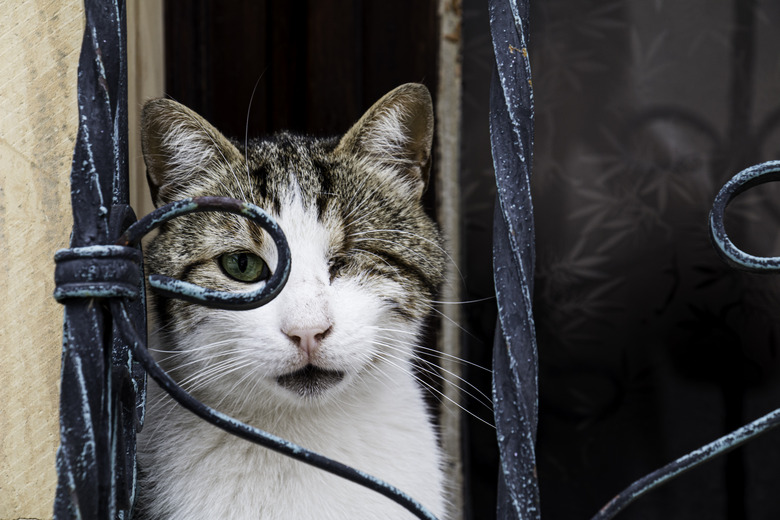How To Take Care Of A Blind Or Deaf Cat
If you have your companion cat for a long time, or if you're just a good soul who is considering fostering or adopting a cat with special needs, you may wonder how to take care of a bind or deaf cat. Cats have a remarkable ability to rely on their other senses when they are missing one, but they still need some extra care in their environment so that they have a long happy life.
As cats age, they may lose their sense of sight or hearing, or they may lose their sense of smell and hearing. Some cats are born deaf while others may experience medical issues that may lead to sudden blindness. Whatever the cause, small support such as the location of the litter box can help with cats adapting to the change.
Sudden blindness in cats
Sudden blindness in cats
The Cornell Feline Health Center says that sudden blindness in cats is rare, thankfully. If one day your cat is fine and the next day she is bumping into furniture in your home she knows well, it is likely that something traumatic happened. That could include a blow to the head, a ruptured blood vessel in the eye, or damage the retina from a reaction to an antibacterial medication called enrofloxacin.
Chances are, though, that while the blindness manifested suddenly, it was likely in the works for a while due to some unnoticed health condition. High blood pressure, for instance, can cause increased pressure in the small blood vessels of the retina. VCA Hospitals says that high blood pressure should be suspected in the case of onset of sudden, unexplained total blindness.
Deafness in cats
Deafness in cats
Cats can either be born deaf or deafness develops through some sort of infection, trauma, or degeneration of the ear. Some all-white cats with blue eyes have a genetic likelihood of being born deaf. Deafness in cats who aren't born deaf often results from a viral infection. Many cats with partial or complete deafness can learn to adapt very well.
Deaf cats can not hear traffic or dangers such as other animals. A deaf or blind cat should not be let outdoors except on a leash or in a supervised or secure setting, such as a cat porch. A deaf cat may not realize they have knocked something over, for instance, because they can't hear. They will need more supervision in general, and both blind and deaf cats need their environment to be a safe one free of obstacles and clutter.
Training deaf or blind cats
Training deaf or blind cats
Beverly Hills Veterinary Associates says training a deaf or blind cat is not really any different than training other animals. They say that clicker training works very well for blind cats. If your cat can't hear, try training them using hand signals or a small flashlight in place of a clicker. Usually, we associate clicker training with training to get a desired behavior, such as our pet doing a trick. But in the case of training deaf or blind cats, you can use your clicker to let them know when you have put out the food, or when you have cleaned the litter box.
Your hearing cat will know you're home because they can hear the door open and close, hear your voice, and hear your footsteps. A deaf cat may not be able to do that. They may not hear that you have placed out food because they can't hear the food rattle around in the bowl.
VCA Hospitals has some advice for living with a deaf cat, including understanding that they will use their sense of vision primarily as a means of adjusting to their surroundings. Instead of using your voice to let him know when he has done something you don't want him to do, such as jump on the counter, wave your arms instead.
Helping blind or deaf cats adapt
Helping blind or deaf cats adapt
Caring for blind or deaf pets (or both) requires just a little adjustment. Here are some things you can do when your cat's adapting to loss of vision, or senses of smell and hearing. A pet who's gone blind or deaf suddenly will possibly be agitated and confused, and need extra TLC. One who has lost their abilities due to aging may have already figured out some strategies, but may need your support for an ongoing happy life.
- Avoid startling a pet who has lost their hearing or vision. If your cat can hear, speaking to your cat before you approach and as you approach can help give your cat advance notice.
- Keep your furniture in the same location. Blind cats will create mental routes around the house.
- Move litter boxes into easy-to-get to locations where they don't need to climb stairs or go through other obstacles to get to it.
- Use clear voice commands with a blind cat.
- Avoid picking your blind cat up too much, as it may be left disoriented and not sure where it is when you put it down.
- Pet Boarding & Daycare says a startled cat may respond with aggression. Deaf cats can hear vibrations, so they may hear your footsteps. Gently tap your foot to announce yourself, or flash a small flashlight.
- A deaf or blind cat may be comforted by stroking, brushing, or combing.
- A blind cat may enjoy playing with toys that smell like catnip, or toys that crinkle. A deaf cat can enjoy toys that smell like catnip or battery-operated toys that move.
- Block access to stairs so a blind cat doesn't fall.
- Teach children appropriate respect for deaf or blind cats.
Blind cats and their litter box
Blind cats and their litter box
Cat Health suggests some ways of dealing with the litter box issues with blind cats. In addition to keeping the litter box where she is used to finding it, they suggest putting a litter mat right next to it. She will learn that the change in texture means she is right next to the litter box. Keep the litter box shallow. Place newspaper or towels around the litter box, because there's a higher likelihood that she'll miss. Just have some extra patience!
Conclusion
Conclusion
You may need to make some small adjustments to help your cats adapting to becoming a deaf or blind cat. Blind and deaf cats can still lead a long and happy life, but one of the most important things to remember is that they can not defend themselves as well. A deaf cat cannot hear traffic or other animals, and a blind cat cannot see the same dangers. A deaf or blind cat should be in a protected household environment and not let outside by themselves.
Making some small changes to your home such as not moving around furniture can help blind cats stay confident in being able to navigate their environment. Using a flashlight or gently tapping your feet to communicate when you walk into a room can let your deaf cat know you are there. A deaf or blind cat can still be a wonderful companion, but just be sure that you have a little more patience with them for the inconveniences that will inevitably occur.
Always check with your veterinarian before changing your pet's diet, medication, or physical activity routines. This information is not a substitute for a vet's opinion.
References
- VCA Hospitals: Hypertension or High Blood Pressure in Cats
- Cornell Feline Health Center: Sudden Blindness
- Beverly Hills Veterinary Associates: No Hearing? No Sight? No Problem! Caring for Blind or Deaf Pets
- VCA Hospitals: Living With a Deaf Cat
- Pet Boarding & Daycare: Boarding Blind or Deaf Cats
- Cat Health: How To Care For a Blind Cat




